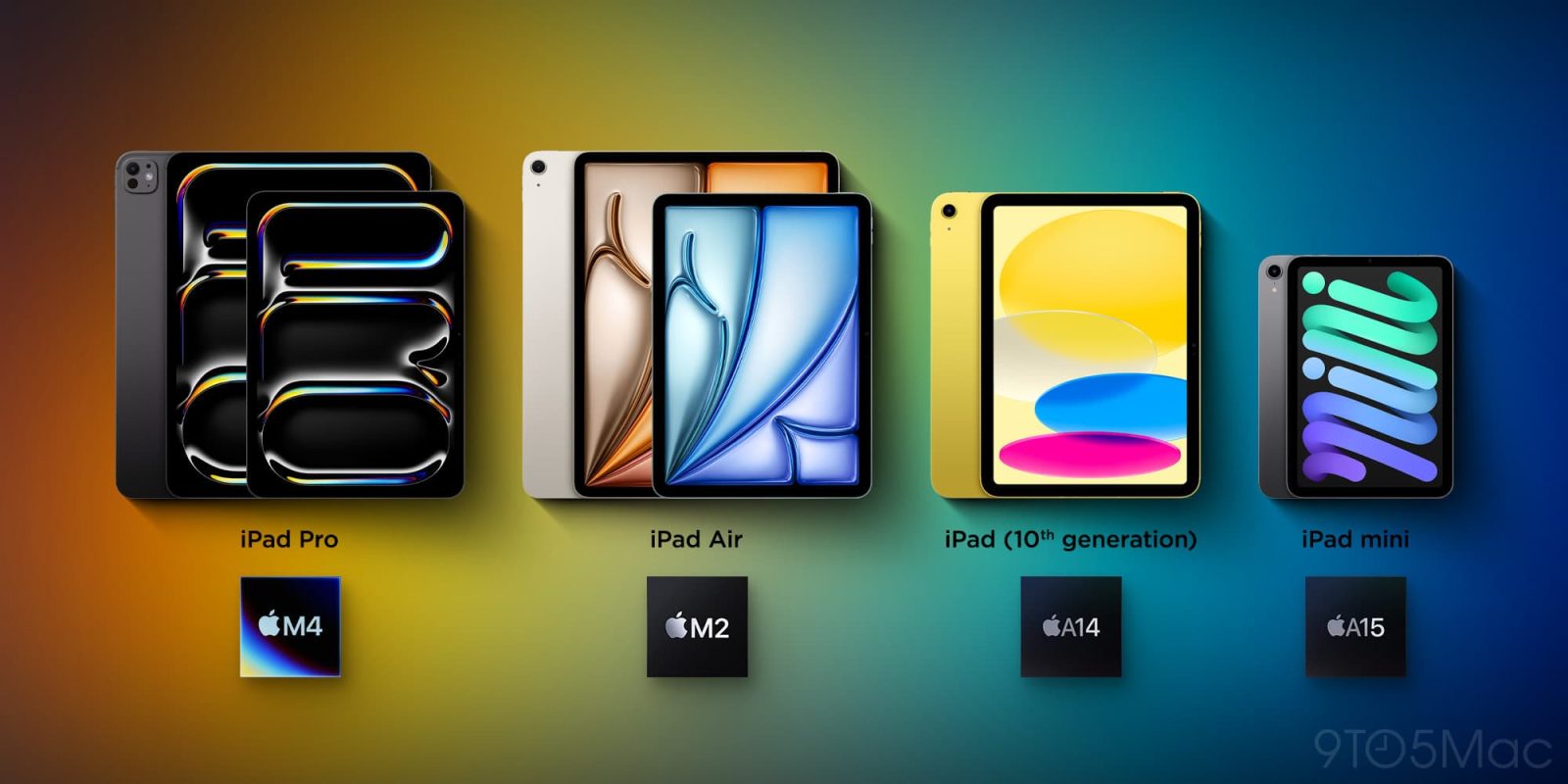
With the M4 iPad Pro and M2 iPad Air arriving this year, we have a fresh 2024 lineup of Apple tablets which also includes the iPad 10 and iPad mini. Join along for a look at how all the devices are similar and different with iPad Pro vs Air, 10, and mini.
Update 10/17/24: The iPad mini 7 has landed, check out our updated full iPad comparison here.
The 2024 iPad Pro levels up performance as the first Apple device with the M4 chip. And the new mid-tier Apple tablet is the M2 iPad Air which comes in two sizes for the first time.
Meanwhile, the iPad 10 and iPad mini use the A14 and A15 Bionic, respectively. So what is all different between these 2024 iPads and is the high-end worth the extra money?
Let’s jump into all the spec differences and we’ll finish up with a buyer’s guide.
Table of contents
iPad Pro vs Air, 10, and mini
Performance
The big differentiator in performance between the new iPad Pro, Air, 10, and mini is thanks to the upgrade of the M4 chip. Apple says it delivers up to a 50% faster CPU, 4x faster GPU, and a boost in memory bandwidth from 100GB/s to 120GB/s over the M2.
And the M4 performance is multiple times faster than the A14 and A15.
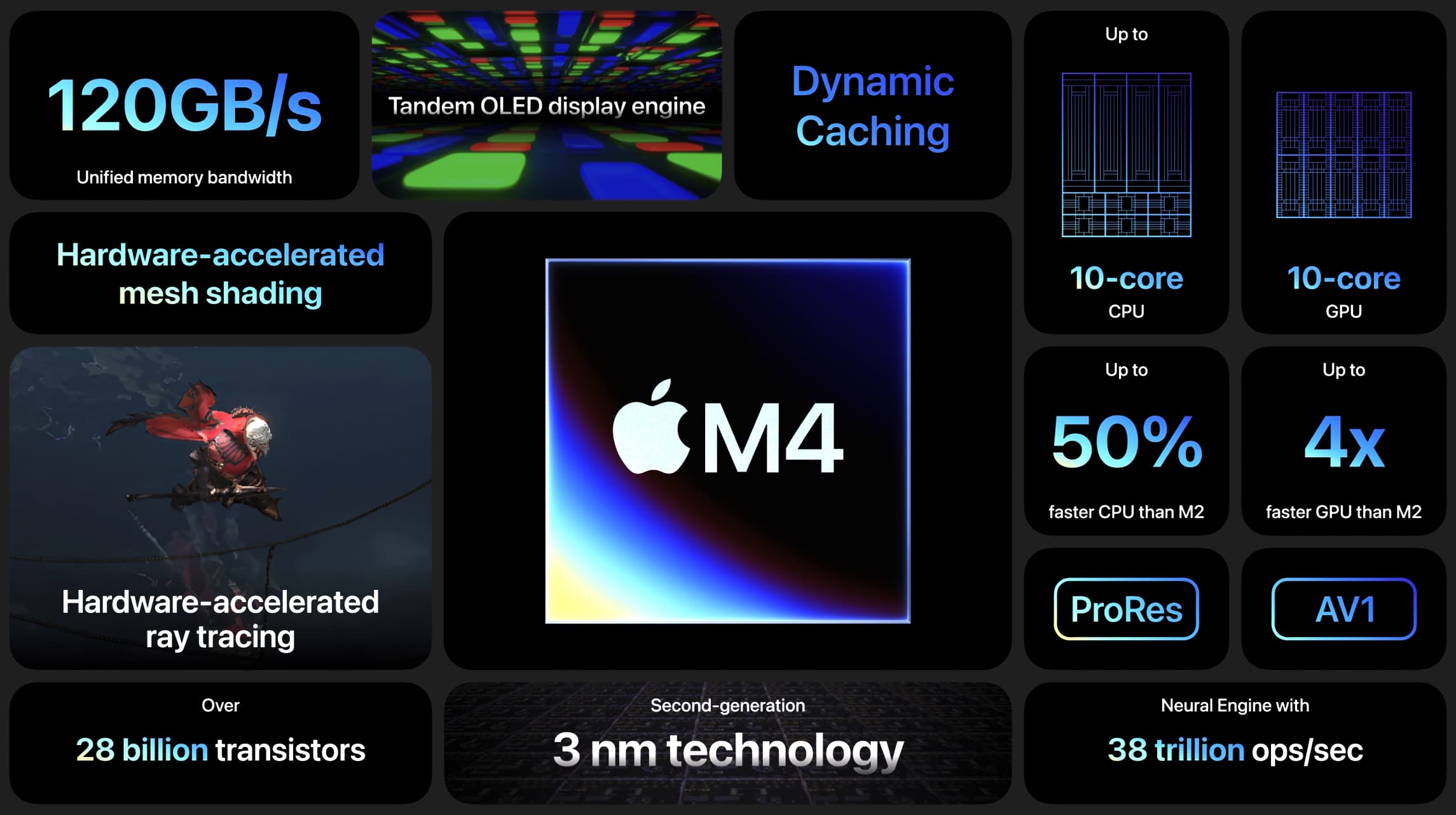
Along with the new GPU comes a media engine that offers hardware-accelerated 8K H.264, HEVC, ProRes, and ProRes RAW support – joining the Mac as a device able to handle 8K video.
Other new features include 38 trillion operations per second with the M4 Neural Engine, hardware-accelerated ray tracing, and more.
Note: iPad Pro models with 128, 256, and 512GB storage have 8GB RAM, 1TB and 2TB models have 16GB RAM.
| M4 iPad Pro | M2 iPad Air | iPad 10 | iPad mini | |
| Chip | M4 | M2 | A14 Bionic | A15 Bionic |
| CPU | 9 or 10-core | 8-core | 6-core | 6-core |
| GPU | 10-core | 10-core | 4-core | 5-core |
| Hardware-accelerated 8K H.264, HEVC, ProRes, and ProRes RAW support | ✅ | ❌ | ❌ | ❌ |
| Hardware-accelerated H.264 and HEVC | – | ✅ | ❌ | ❌ |
| Hardware-accelerated ray tracing | ✅ | ✅ | ❌ | ❌ |
| Neural Engine | 16-core | 16-core | 16-core | 16-core |
| Storage | 256GB – 2TB | 128GB – 1TB | 64 or 256GB | 64 or 256GB |
| RAM | 8 or 16GB | 8GB | 4GB | 4GB |
| Memory bandwidth | 120GB/s | 100GB/s | ? | ? |
| Thunderbolt/USB 4 | ✅ | ❌ | ❌ | ❌ |
| USB-C | – | ✅ 3.1 Gen 2 | ✅ USB-C 2 | ✅ USB-C 3 |
| Cellular | 5G (sub-6 GHz) | 5G (sub-6 GHz) | 5G (sub-6 GHz) | 5G (sub-6 GHz) |
Other upgrades with the Pro are Thunderbolt/USB 4 and hardware-accelerated ray tracing.
One loss is mmWave connectivity for 5G with the 2024 iPad Pro models (2022 versions had this). That matches the 5G radio in the M2 iPad Air, iPad 10, and iPad mini.
Something to keep in mind with performance, unless you’re running your iPad hard with pro-level (or aspiring pro workflows) like video editing, graphic design, etc., you probably don’t need or might not even notice the M4 or M2 chip upgrade and will be served just fine with the A14 or A15.
Display
The new M4 iPad Pro models go beyond the iPad Air, 10, and mini with a new “Ultra Retina XDR Display.”
It’s the first to use Tandem OLED compared to the Liquid Retina Display that uses LED in the M2 iPad Air devices.
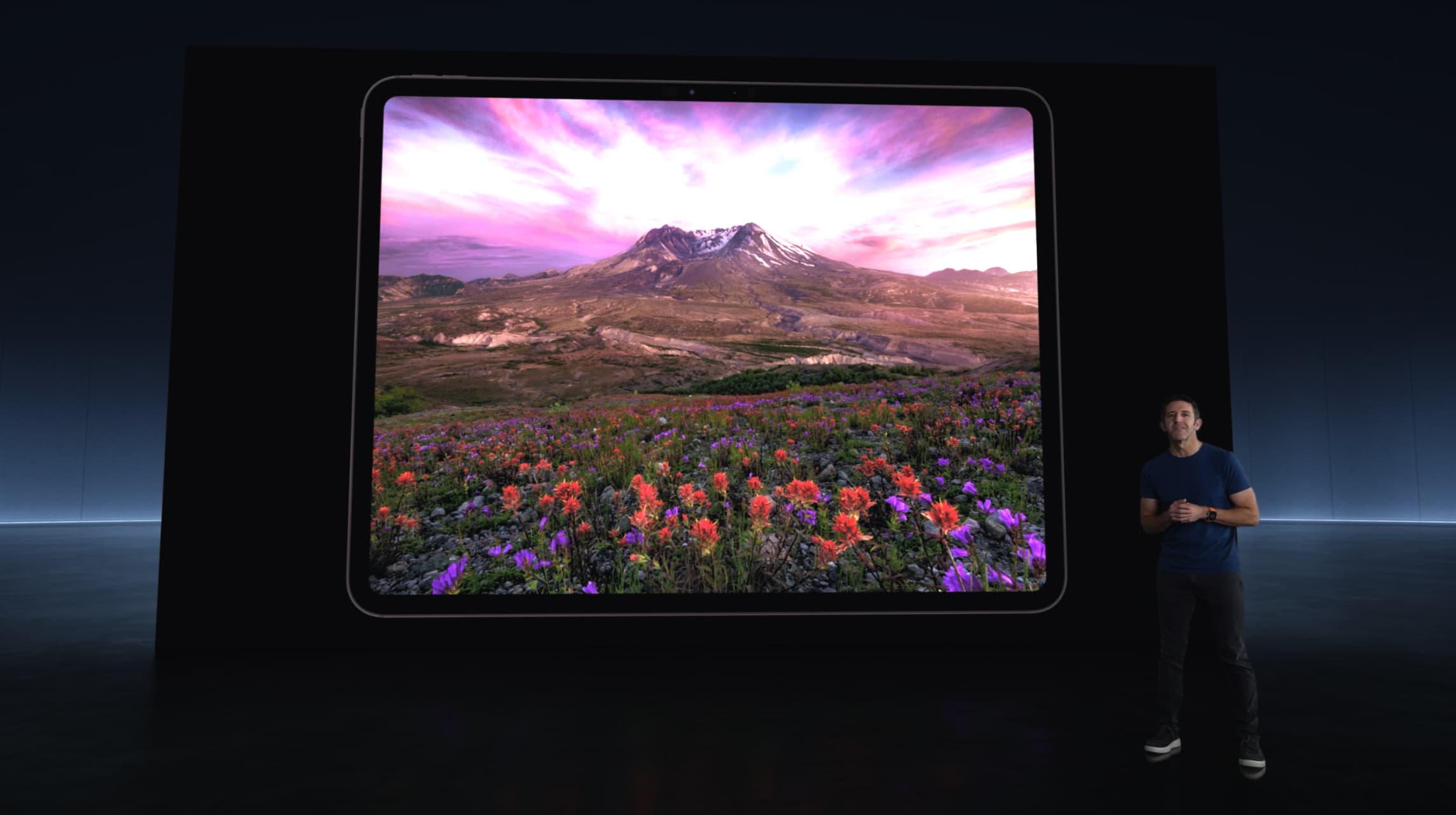
Apple says the benefits of the new OLED display are brighter specular highlights, deeper true blacks, better detail in shadows and low light, and more.
Both the smaller and larger iPad Pro feature the new OLED display and you can also now upgrade the 1 or 2TB M4 iPad Pro with nano-texture display glass.
You also get brighter SDR content up to 1000 nits with the M4 iPad Pro models (600 nits for M2 iPad Pro SDR content). That’s ~2x brighter than the 500 nits for SDR with the iPad Air, 10, and mini.
| M4 iPad Pro | M2 iPad Air | iPad 10 | iPad mini | |
| Display | 11″ or 13″ OLED | 10.86″ or 12.9″ LED | 10.9″ LED | 8.3″ LED |
| Resolution | 2420 x 1668 / 2752 x 2064 | 2360 x 1640 / 2732 x 2048 | 2360 x 1640 | 2266 x 1488 |
| PPI (pixels per inch) | 264 | 264 | 264 | 326 |
| Display brightness | 1000 nits SDR, 1000 nits max full screen XDR, 1600 nits peak (HDR only) | 500/600 nits brightness for SDR | 500 nits brightness for SDR | 500 nits brightness for SDR |
| True Tone | ✅ | ✅ | ✅ | ✅ |
| P3 wide color | ✅ | ✅ | ❌ | ✅ |
| ProMotion (120Hz) | ✅ | ❌ | ❌ | ❌ |
| Anti-reflective and fingerprint-resistant coating | ✅ | ✅ | ❌ | ✅ |
| Fully laminated display | ✅ | ✅ | ❌ | ✅ |
| Nano-texture display glass | Optional on 1TB and 2TB models | ❌ | ❌ | ❌ |
| Liquid Retina Display | – | ✅ | ✅ | ✅ |
| Ultra Retina XDR Display | ✅ | ❌ | ❌ | ❌ |
| Apple Pencil Hover | ✅ | ✅ | ❌ | ❌ |
Shared display features across all M4 iPad Pro and M2 iPad Air models include P3 wide color, fully laminated displays, anti-reflective coating, Apple Pencil Hover, and True Tone.
The iPad mini includes most of those, with the iPad 10 having the least advanced – but still a solid LED Liquid Retina display.
Design, dimensions, weight, colors
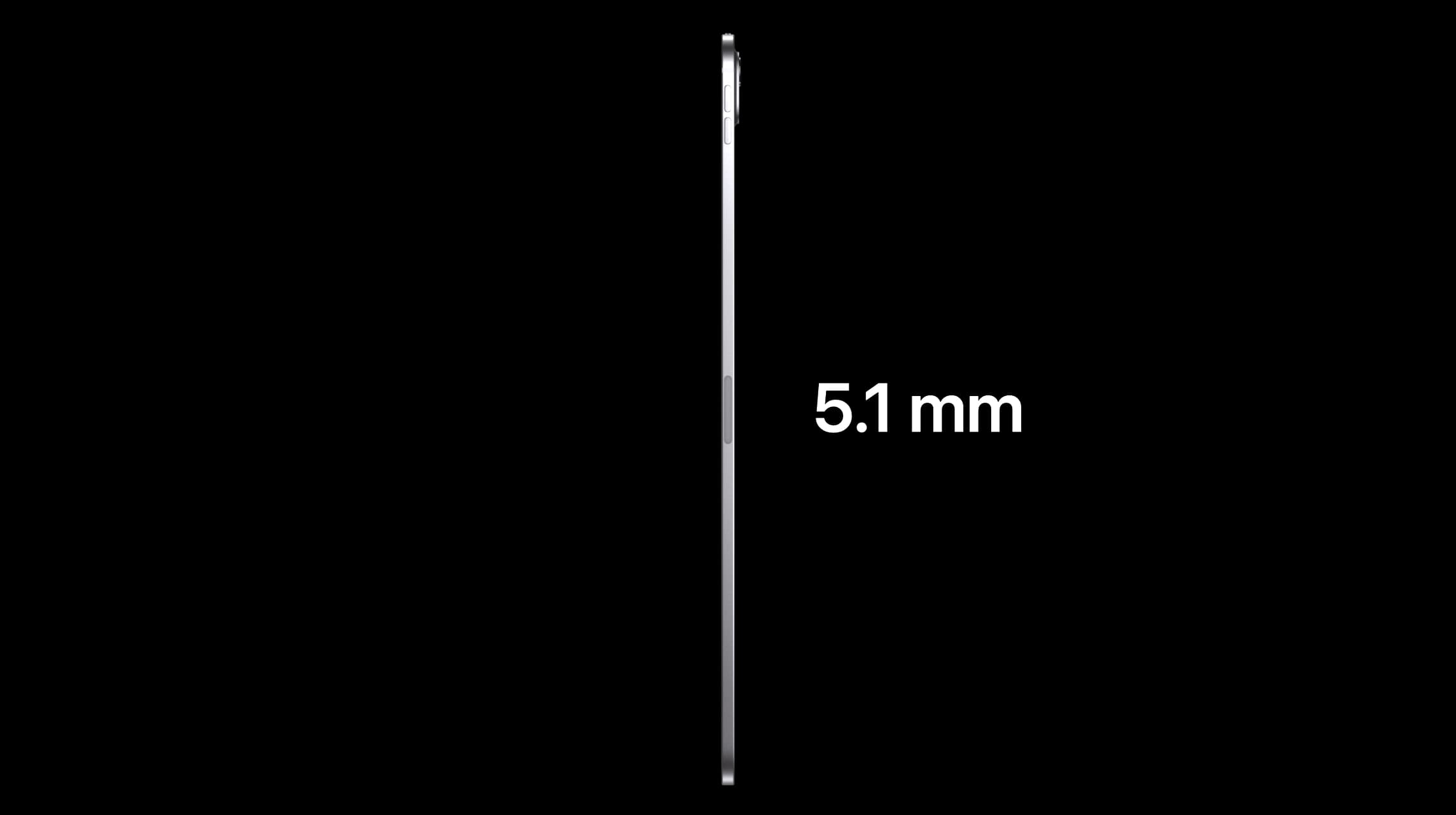
The M4 iPad Pro is the “thinnest product Apple has ever created” at 5.1mm for the 13″ model and 5.3mm for the 11″ version.
Along with that, the new M4 iPad Pro is lighter than ever, under 1 pound for the 11″ and 1.28 pounds for the 13″.
That’s ironic since the “Air” version of Apple’s iPad and Mac usually claim the title for thinnest and lightest.
However, the iPad mini is lighter than any of the other iPads given it has the smallest screen and footprint.
| 11″ M4 iPad Pro | 11″ M2 iPad Air | 13″ M4 iPad Pro | 13″ M2 iPad Air | 10.9″ iPad 10 | 8.3″ iPad mini | |
| Height | 9.83 inches (249.7 mm) | 9.74 inches (247.6 mm) | 11.09 inches (281.6 mm) | 11.04 inches (280.6 mm) | 9.79 inches (248.6 mm) | 7.69 inches (195.4 mm) |
| Width | 6.99 inches (177.5 mm) | 7.02 inches (178.5 mm) | 8.48 inches (215.5 mm) | 8.46 inches (214.9 mm) | 7.07 inches (179.5 mm) | 5.3 inches (134.8 mm) |
| Depth | 0.21 inch (5.3 mm) | 0.24 inch (6.1 mm) | 0.20 inch (5.1 mm) | 0.24 inch (6.1 mm) | 0.28 inches (7 mm) | 0.25 inches (6.3 mm) |
| Weight | 0.98 pounds (446 grams) | 1.02 pounds (462 grams) | 1.28 pounds (582 grams) | 1.36 pounds (618 grams) | 1.05 pounds (477 grams) | 0.65 pounds (293 grams) |
New this time around is the Space Black finish replacing Space Gray for the M4 iPad Pro while silver remains the other choice.
Meanwhile, the M2 iPad Air is available in four color choices: Space Gray, Starlight, blue, and purple.
The iPad 10 comes in silver, blue, pink and yellow, while the iPad mini is available in Space Gray, Starlight, purple, and pink.
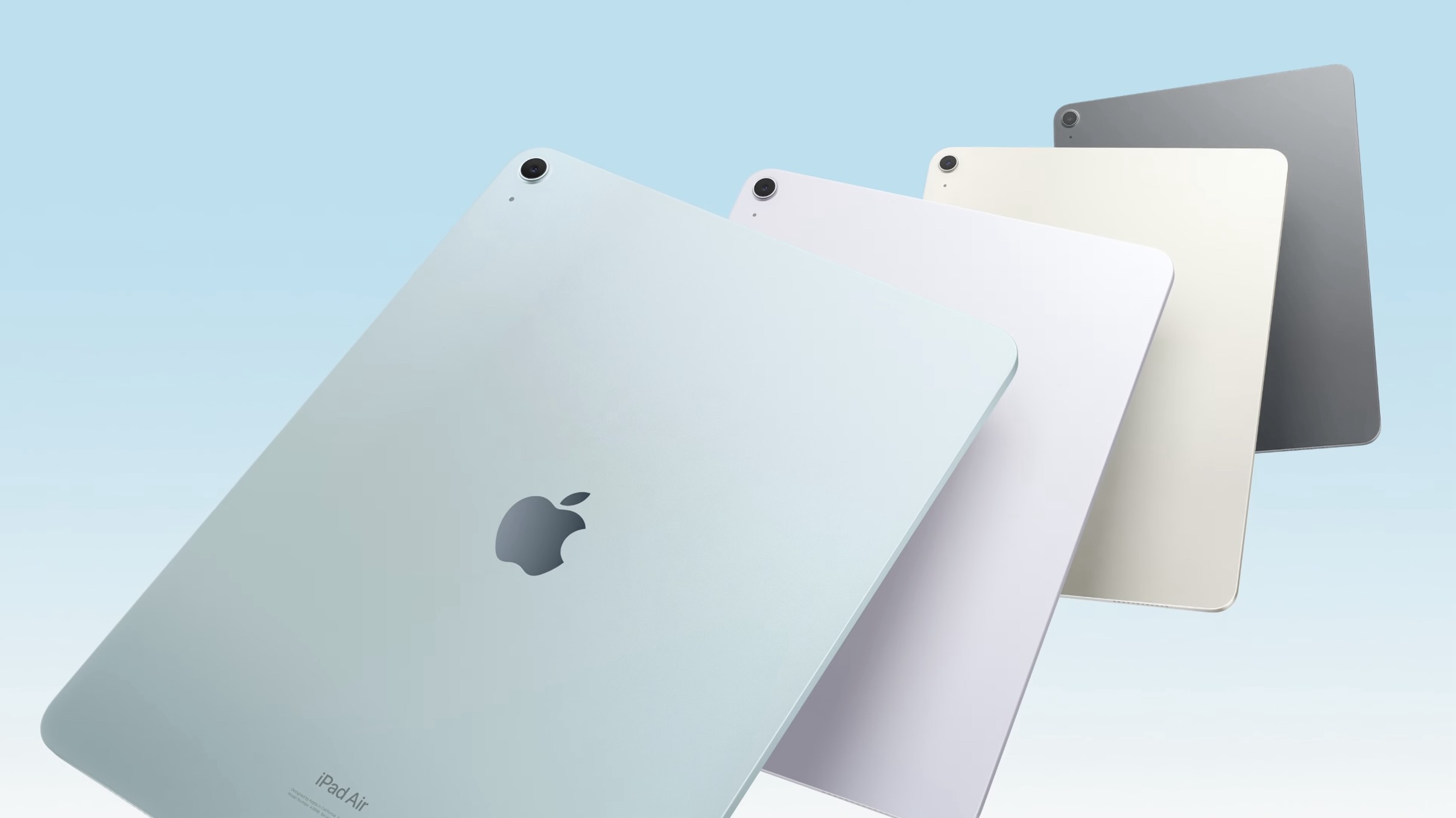
Connectivity and accessories
The new iPad Pro and Air models work with the same type of Apple accessories. Those come in the form of a new Magic Keyboard and Apple Pencil Pro – or you could opt for the mid-tier Apple Pencil with USB-C.
The iPad 10 and mini work with slightly different Apple accessories.
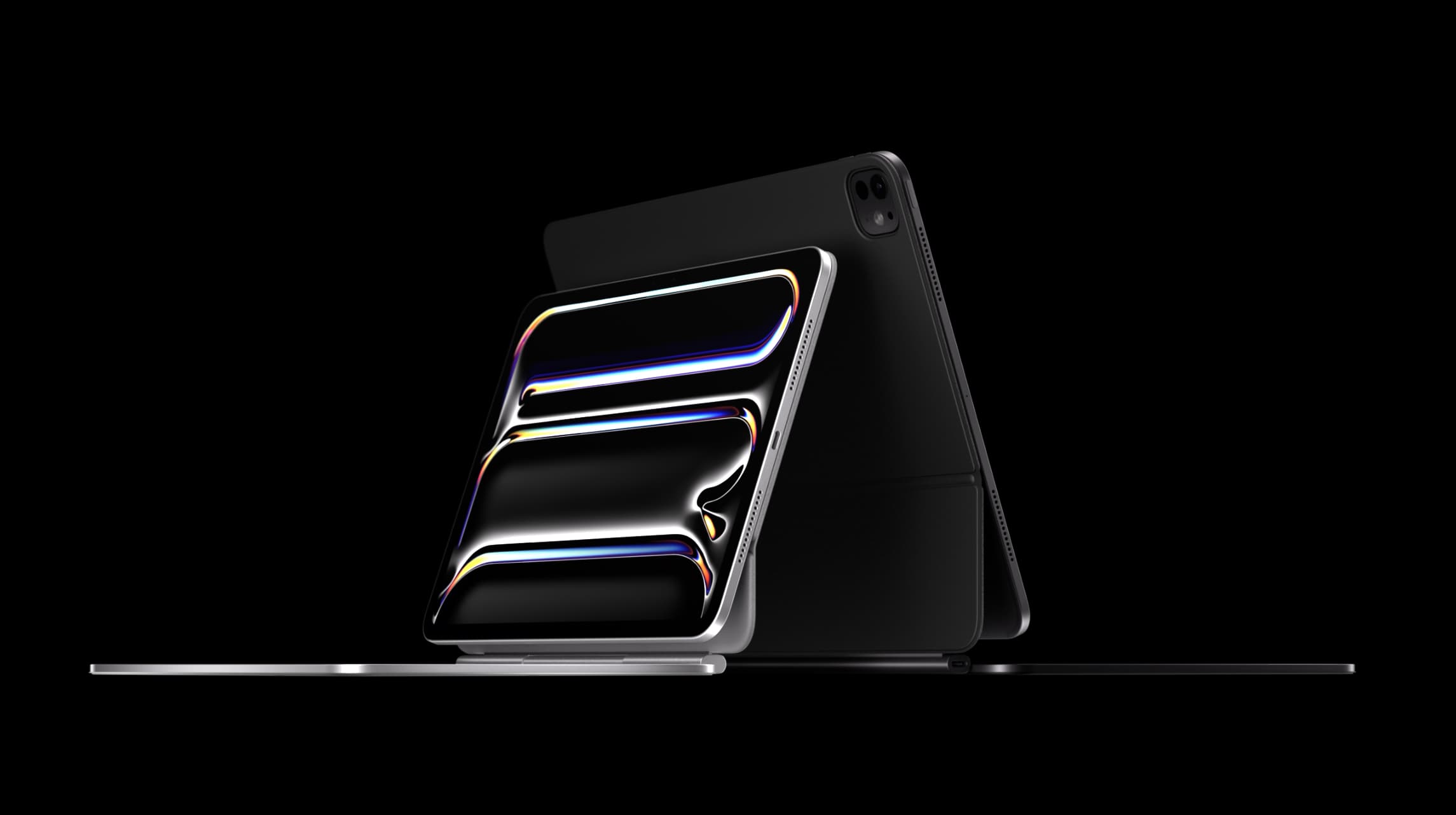
- Apple Pencil Pro launches, with squeeze gesture and roll, plus Find My support
- Apple debuts Magic Keyboard for M4 iPad Pro with larger trackpad, function row, aluminum palm rest
The other main I/O upgrades with the iPad Pro are Face ID and Thunderbolt connectivity.
| M4 iPad Pro | M2 iPad Air | iPad 10 | iPad mini | |
| Apple Pencil Pro support | ✅ | ✅ | ❌ | ❌ |
| Apple Pencil gen 2 support | ❌ | ❌ | ❌ | ✅ |
| Apple Pencil USB-C | ✅ | ✅ | ✅ | ✅ |
| Magic Keyboard support | ✅ | ✅ | ❌ | ❌ |
| Magic Keyboard Folio support | ❌ | ❌ | ✅ | ❌ |
| 5G | ✅ (sub-6Ghz) | ✅ (sub-6Ghz) | ✅ (sub-6Ghz) | ✅ (sub-6Ghz) |
| WiFi 6 | – | – | ✅ | ✅ |
| WiFi 6E | ✅ | ✅ | ❌ | ❌ |
| SIM | eSIM only | eSIM only | eSIM and nano-SIM | eSIM and nano-SIM |
| Bluetooth | 5.3 | 5.3 | 5.2 | 5.0 |
| USB-C | ✅ USB 4 | ✅ USB 3.1 Gen 2 | ✅ USB 2 | ✅ USB 3 |
| Thunderbolt | ✅ | ❌ | ❌ | ❌ |
| Face ID | ✅ | ❌ | ❌ | ❌ |
| Touch ID | ❌ | ✅ | ✅ | ✅ |
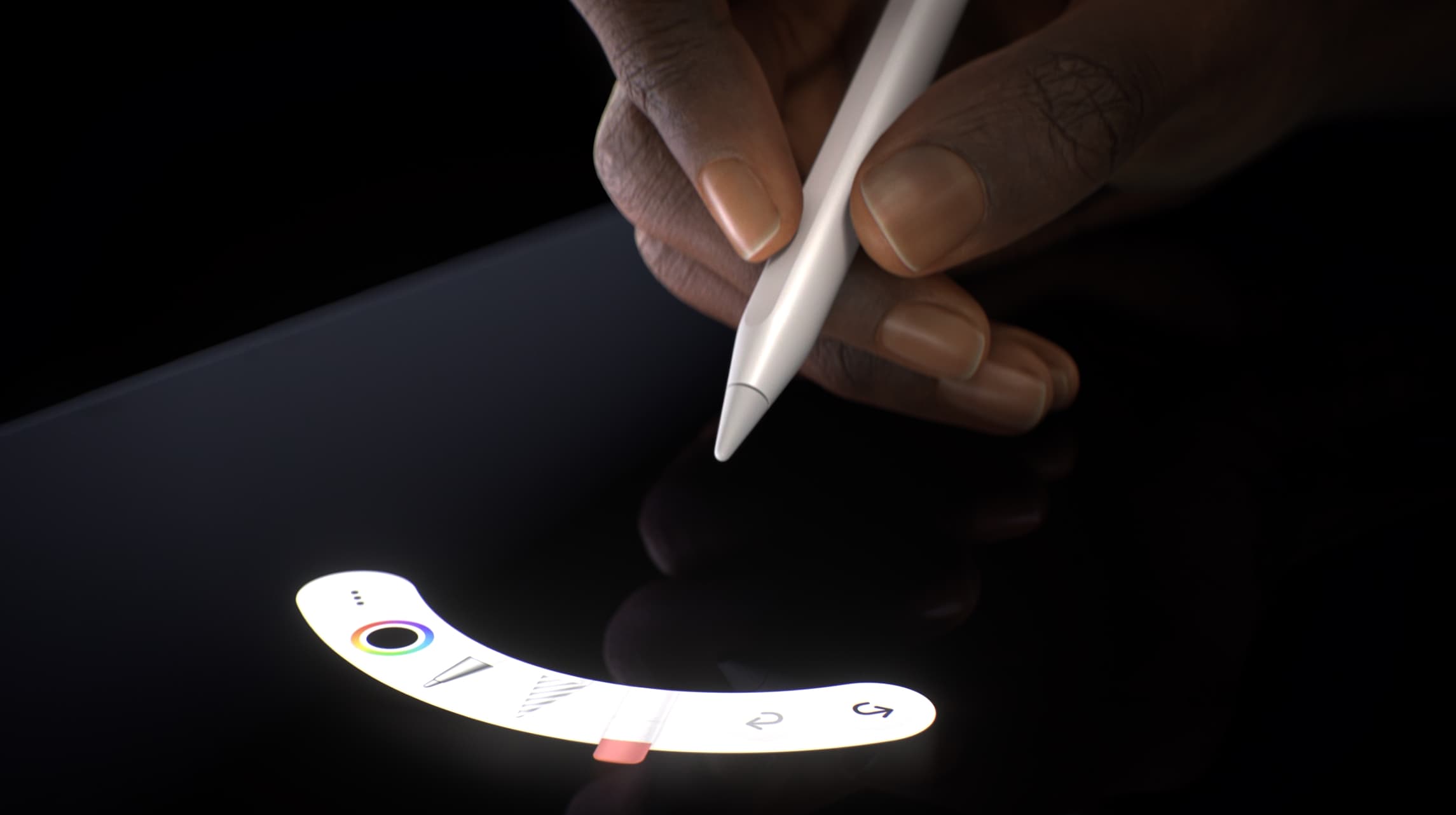
Beyond the drop of mmWave for 5G, the M4 iPad Pro and M2 iPad Air devices also only have an eSIM, no physical nano-SIM slot.
Battery life
All of the current iPad models come with the same battery life as previous iPads:
- 10 hours of web or video use on WiFi
- 9 hours of web use with cellular
Storage and price
Storage has been updated with the M4 iPad Pro starting with 256GB and going up to 2TB models. And the nano-texture glass is another $100 upgrade.
Storage also gets bumped for the M2 iPad Air starting with 128GB and going up to 1TB.
| 11/13″ M4 iPad Pro | 11/13″ M2 iPad Air | iPad 10 | iPad mini | |
| 64GB WiFi | – | – | $349 | $499 |
| 64GB + cell | – | – | $499 | $649 |
| 128GB WiFi | – | $599/$799 | – | |
| 128GB + cell | – | $749/$949 | – | |
| 256GB WiFi | $999/$1,299 | $699/$899 | $499 | $649 |
| 256GB + cell | $1,199/$1,499 | $849/$1,049 | $649 | $799 |
| 512GB WiFi | $1,199/$1,499 | $899/$1,099 | – | |
| 512GB + cell | $1,399/$1,699 | $1,049/$1,299 | – | |
| 1TB WiFi | $1,599/$1,899 | $1,099/$1,299 | – | |
| 1TB + cell | $1,799/$2,099 | $1,249/$1,449 | – | |
| 2TB WiFi | $1,999/$2,299 | – | – | – |
| 2TB + cell | $2,199/$2,499 | – | – | – |
Cameras, video, and audio
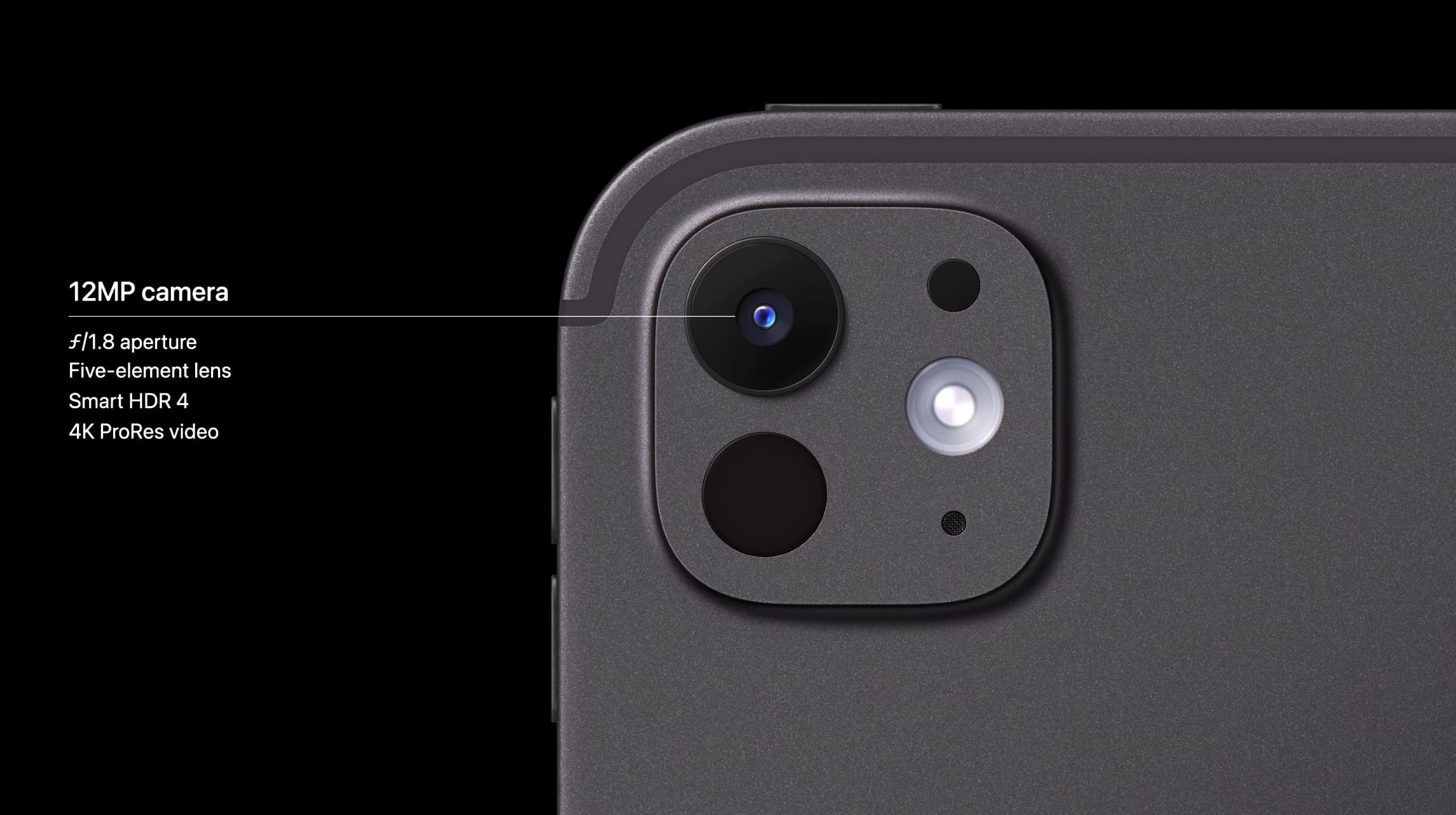
On the M4 iPad Pro rear camera system, you’ve got a 12MP wide lens, LiDAR Scanner, and a Retina Flash with True Tone.
Interestingly, the M4 iPad Pro has ditched the 10MP ultra wide lens of the M2 iPad Pro. That means the M4 iPad Pro and M2 iPad Air are more similar in camera capabilities.
On the front, you get a 12MP ultra wide lens with Center Stage support that’s now centered on the long landscape edge instead of the short edge with the 2024 M4 iPad Pro models.
The rest of the iPad lineup features a 12MP wide rear camera but doesn’t have all the niceties of the Pro models.
| 11/13″ M4 iPad Pro | 11/13″ M2 iPad Air | iPad 10 | iPad mini | |
| 12MP wide rear lens | ✅ | ✅ | ✅ | ✅ |
| LiDAR | ✅ | ❌ | ❌ | ❌ |
| 4K video | ✅ | ✅ | ✅ | ✅ |
| ProRes video up to 4K 30 fps | ✅ | ❌ | ❌ | ❌ |
| Extended dynamic range | ✅ | ✅ | ✅ | ✅ |
| Slo-mo video | ✅ | ✅ | ✅ | ✅ |
| Rear camera flash | ✅ | ❌ | ❌ | ✅ |
| TrueDepth with Face ID | ✅ (landscape edge) | ❌ | ❌ | ❌ |
| Ultra wide 12MP front camera | ✅ (landscape edge) | ✅ (landscape edge) | ✅ (landscape edge) | ✅ (portrait edge) |
| Smart HDR 3 photos | – | – | ✅ | ✅ |
| Smart HDR 4 photos | ✅ | ✅ | ❌ | ❌ |
| Center Stage auto-tracking | ✅ | ✅ | ✅ | ❌ |
| 4-speaker audio | ✅ | ✅ | ❌ | ❌ |
| 2-speaker audio | – | – | ✅ | ✅ |
| Studio-quality mics | 4 | ❌ | ❌ | ❌ |
| Standard mics | – | 2 | 2 | 2 |
iPad Pro vs Air, 10, and mini conclusion
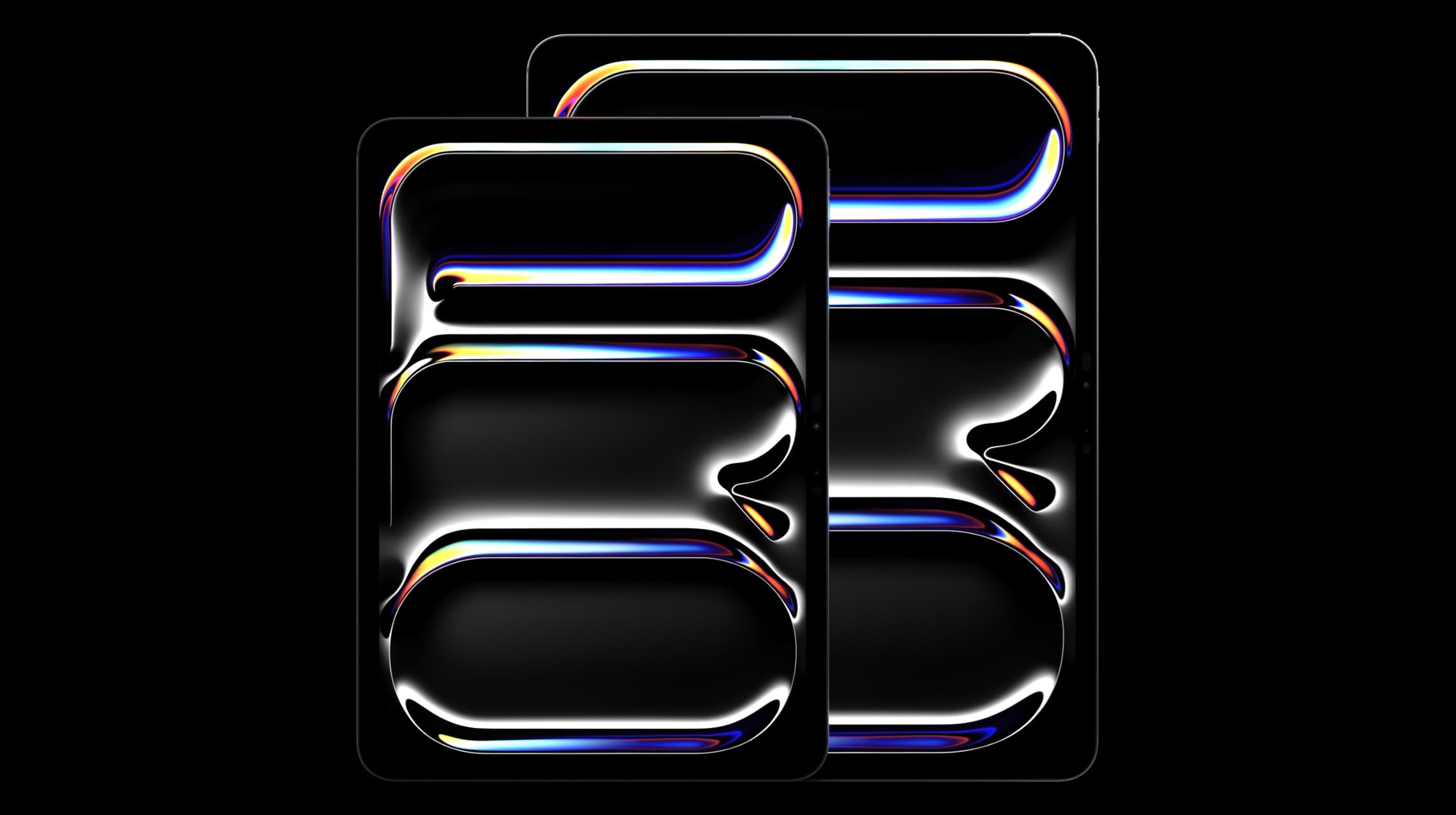
Why buy M4 iPad Pro?
When choosing between the M4 iPad Pro and M2 iPad Air, it may make the most sense to only buy the new model if you’re a pro or an aspiring pro with workflows that will benefit from the M4 chip. Or you’re just fine with spending the money on the latest and greatest from Apple 😁.
Upgrades include the new OLED display with a nano-texture option and higher brightness, higher top storage, Thunderbolt, a more powerful chip, and a slimmer design.
The M4 iPad Pro is available at Apple, Amazon, soon Best Buy, and more.
Why buy M2 iPad Air?
When you can get many of the M4 iPad Pro core features with the M2 iPad Air and the processor difference not being a limiting factor for many users, saving the money could be a nice move. Or you could keep your current iPad.
Also, at a discount, the M1 iPad Air is a great choice for people with light to medium workflows or casual use. It’s got many of the great features of the modern M2 iPad Air/Pro and the same design.
Why buy iPad 10?
When you consider all the similarities and differences, the iPad 10 is a great choice for casual use cases as well as light to medium work, school, and creative workflows.
At regular pricing, it’s $150-200 less than the iPad Air while including many of the best features, making it the best choice for most users.
The iPad 10 is available from Apple, Amazon, Best Buy, and more.
Why buy iPad mini?
With a price tag almost as expensive as the M2 iPad Air, the iPad mini is mostly appealing to those who value the small form factor above specs and performance.
Thanks for reading our guide on the iPad Pro vs Air, 10, and mini!
Read more 9to5Mac comparisons and tutorials:
- M4 iPad Pro vs M2 iPad Air: Is it worth the extra money?
- M2 iPad Air vs M1 iPad Air: What’s upgraded?
- Here’s how to see iPad battery health and when should you consider a replacement?
- Here’s how to protect against ‘GoldPickaxe’, the first iPhone trojan
FTC: We use income earning auto affiliate links. More.




Comments